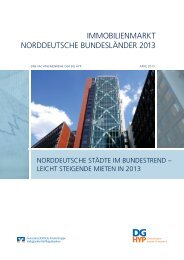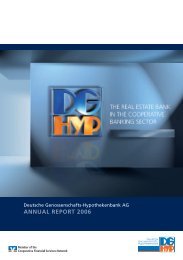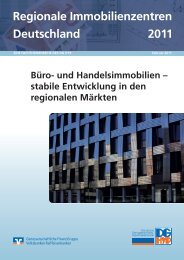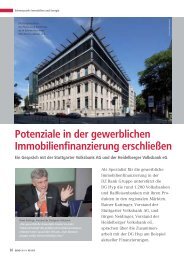Real Estate Market Germany 2009 - Deutsche Genossenschafts ...
Real Estate Market Germany 2009 - Deutsche Genossenschafts ...
Real Estate Market Germany 2009 - Deutsche Genossenschafts ...
You also want an ePaper? Increase the reach of your titles
YUMPU automatically turns print PDFs into web optimized ePapers that Google loves.
DG HYP REAL ESTATE MARKET GERMANY SEPTEMBER <strong>2009</strong><br />
Subdued trend in office rents in <strong>Germany</strong> High vacancy rate on an international comparison<br />
30<br />
25<br />
20<br />
15<br />
10<br />
5<br />
0<br />
-5<br />
-10<br />
1998 2000 2002 2004 2006 2008<br />
<strong>Germany</strong> France UK<br />
Source: Feri, rent per sq m office space as % yoy<br />
Situation and trends<br />
As a result of the macroeconomic recession, demand for office space in <strong>Germany</strong> declined<br />
sharply in autumn 2008. However, last year on average there was still no sign of a decline<br />
in rents for office space in prime locations. On the contrary, in most locations rents were still<br />
clearly rising: the highest level was in Frankfurt (+6.2%), followed by Hamburg (+4.8%),<br />
Munich (+4.2%), Düsseldorf (+4.1%) and Berlin (+3.3%). In contrast, rents in Stuttgart were<br />
already stagnating last year.<br />
We estimate that rents for prime locations in the main office centres are declining by about<br />
5 per cent in <strong>2009</strong>. This would be a similarly sharp decline as last reported in 2004. Rents<br />
are likely to show an above-average decline this year in Berlin and Frankfurt, and in Munich.<br />
An increasing number of tenants in the already favourably priced Berlin office market are<br />
vacating prime locations for cheaper non-central properties, but peak rents are also coming<br />
under severe pressure in the other large locations. In the first quarter, rents were already<br />
declining in the six main office centres, with the downward trend accelerating further in the<br />
second quarter in Frankfurt (-3%) and Munich (-4%).<br />
Figures and forecast for office markets<br />
2008<br />
rent top location<br />
<strong>2009</strong>e<br />
2010e<br />
10<br />
9<br />
8<br />
7<br />
6<br />
5<br />
4<br />
3<br />
2<br />
1998 2000 2002 2004 2006 2008<br />
<strong>Germany</strong> France UK<br />
Source: Feri, vacancy rate relating to office space in average location<br />
2008<br />
vacancy rate<br />
<strong>2009</strong>e<br />
Berlin 22.10 20.30 19.70 8.6 8.9 9.3<br />
Hamburg 24.00 23.60 22.50 7.0 7.9 9.3<br />
Frankfurt 38.50 36.40 34.80 14.4 15.5 15.8<br />
Munich 31.40 29.50 28.60 9.2 10.3 12.0<br />
Düsseldorf 22.90 22.00 20.60 10.1 10.9 12.0<br />
Stuttgart 17.50 16.70 16.20 5.2 6.0 6.3<br />
Source: Feri, DZ BANK Research, rent in EUR monthly per sq m, vacancy rate as % of inventories<br />
Potential tenants in the German office markets are currently being offered numerous<br />
incentives – for example rent-free utilisation at the beginning of a rental contract or the<br />
temporary cost-free use of parking spaces – in order to prevent a steeper decline in rental<br />
prices. However, since job shedding in the office sector has only begun over the course of<br />
Demand for office space down<br />
sharply in 2008<br />
…but rents have mainly increased<br />
Rents down by about 5 per cent in<br />
<strong>2009</strong><br />
2010e<br />
Office rents likely to decline further<br />
in 2010<br />
3














